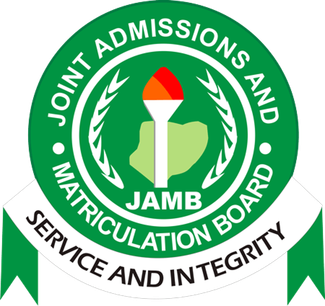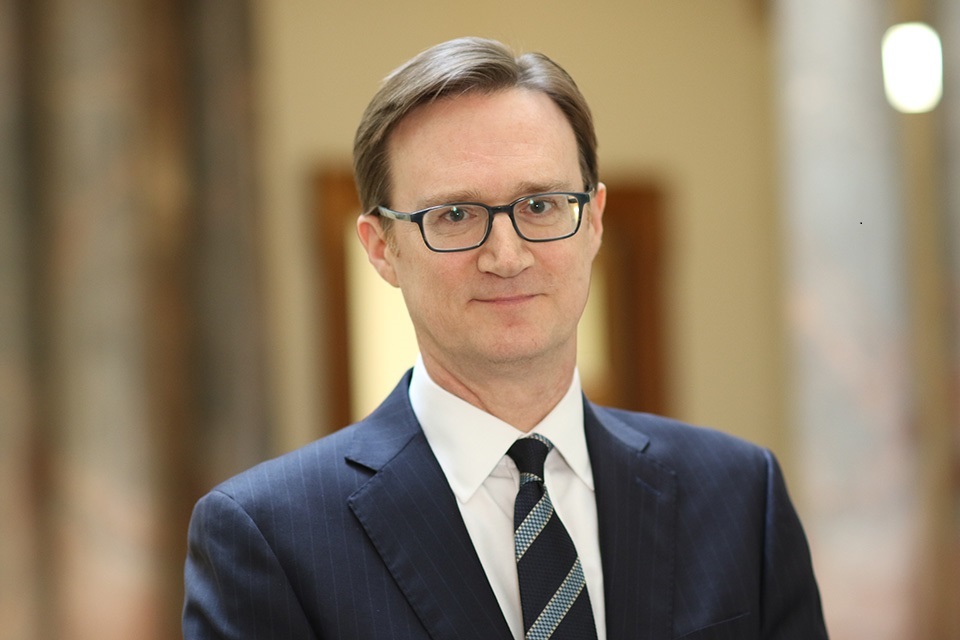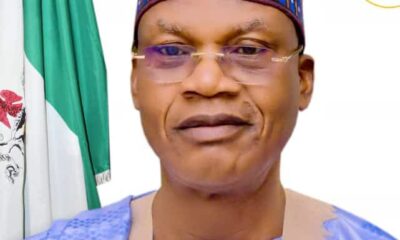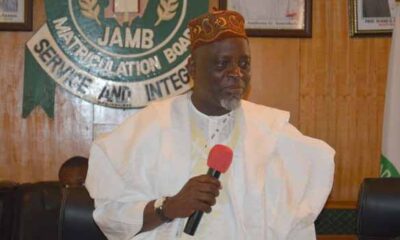News
Again, JAMB extends 2024 Direct Entry registration

The Joint Admissions and Matriculation Board (JAMB) has announced that the registration for Direct Entry has been extended till a later date.
Dr Fabian Benjamin, Public Communication Advisor of the board, stated this in an interview with the newsmen on Thursday in Lagos.
According to him, in a bid to ensure that no Nigerian child is denied access to quality higher education, the board has decided to move the closing date for the Direct Entry registration to a later date.
JAMB had announced the commencement of the registration of the 2024 Direct Entry from Feb. 28 to March 28.
The board also extended the exercise by two weeks, bringing the closing date for the registration to April 11, due to some factors.
“Again, reports reaching us is that there is a surge by candidates, especially in Lagos, to beat this registration deadline.
“The board want to call on all candidates yet to register for the DE, to calm down, as the registration deadline is again, extended.
“This is because of the ongoing UTME in centres across the country.
“Again, it also our mandate to ensure that no Nigerian desirous of access to quality education is left behind.
“The board will soon announce a new date for the end of this year’s DE registration and so, candidates should relax, but ensure they register as soon as possible,” Benjamin said.
Meanwhile, Benjamin has described this year’s UTME which commenced on Friday, April 19, as the best in the history of public examinations in the country.
He said that the exercise which came to an end on Thursday, April 25, had indeed met the board’s expectations.
“This year’s examination is adjudged to be the best in the annals of public examination in Africa, by all standards and I must say it has met the expectations of the board.
“As we finish the 2024 exercise, the board is looking at cases of candidates who could not be verified and a position would be taken on its merit.
“For all those who miss the examination on account of coming late and other related issues not connected to the fault of the board, will have to try next time.
“Examination is only scheduled for candidates who were biometrically verified but unable to sit the examination,” he stated.
“Meanwhile, I will not fail to commend our partners, such as the NIMC, security agencies and others for the huge role they played during the exercise.
“Today, the board has drawn the curtain on this year’s UTME and we really want to appreciate these our partners, for the great role they played in ensuring this very successful outcome,” he said.
The board’s public communication advisor specifically singled out the NIMC for being the game changer.
He added that the NIMC platform used for the registration of candidates, demonstrated that it was possible to curb infractions of any nature, if the will was there.
“The registration exercise starts with candidates sending their NIN number to the board’s USSD codes, to pull their details.
“This has added significant value to the system, as malpractice starts from the point of registration. As soon as this stage is compromised the whole registration would have been gone,” he stated.
NAN reports that not less than 1.9 million candidates registered for this year’s UTME.
News
Only PhD students eligible to bring dependants to UK – Envoy


The United kingdom (UK) says only international students coming in for their Doctor of Philosophy.(PhD) studies were eligible to bring in dependents to the country.
Dr. Richard Montgomery, the British High Commissioner to Nigeria made this known in an interview with the newsmen on Sunday in Abuja.
He said that, the educational system policy changed earlier this year for international students in higher education not to bring dependents into the UK was to curb the increase of foreign student bringing in dependents.
He explained that the huge surge in dependence was putting an unsustainable pressure on many universities, adding that, it was the reason these changes were introduced.
Montgomery added that before his posting as High Commissioner to Nigeria, he had spoken to some of these universities on the policy change, which had been in the pipeline for some time.
He noted that the universities Chancellors had complained of the huge student populations’ highlighting that accommodation was a huge challenge, access to medical services under the National Health Service and access to school if they brought in dependents.
According to him, the restrictions do not apply to all categories, adding that those doing a long term research degree, like a PhD, or doctorate were not affected.
“Those coming to the UK for doctorate can still bring their dependency but if you are coming to the UK with a study visa for an undergraduate degree, or short term master’s degree am afraid the rules have been changed.
“People need to understand why this change was brought in, and it is a sensible change because we have a large higher education sector and most of these universities are in towns across the country.
“There has been a surge recently, in demand for British education and I can give you the macro figures and there has also been a huge increase in foreign students bringing their dependants.
“In the case of Nigeria, in 2019, before the Coronavirus pandemic, there were only one and a half thousand dependents being brought in from Nigeria, with those on study visas,
“In 2022, that figure had increased to fifty two thousand dependants so that’s a thirty fold increase in dependence. And it’s not just about Nigeria by the way.
“It is also about all foreign students, we saw similar rises, for example amongst Indian students coming to study in the UK,” he added
Speaking on the policy initiation it is early to ascertain the impact of the policy on undergraduates because these changes were announced in 2023, but came into effect early this year and we would have to wait until September 2024, before we get the next run of academic tickets, he said.
“I think what your wider audience needs to hear is that the demand for UK education is really strong, in
2022, 65,000 study visas was approved to Nigerian applicants, 65,000, while in September 2023 we received about 115,000 Study visa applications from Nigeria.
“Of which 95 per cent were approved and over 110,000 study visas were issued last September compared to 65,000 of the previous year, there’s almost a doubling of Nigerian study visas in 2023 which means the demand is really high.
” And it is something which I am genuinely pleased and proud about that the UK has such a good higher educational sector and we are still at the six economy, and is still one of the biggest economies but we are only 2.5 per cent of the global economy.
“So we have 17 of the top 100 universities in the world. We have 17 per cent of the top universities, so it is one of our units.
“I really like the demand but there are other factors at play in terms of schooling in the UK , the value of the Naira in the coming months will also determine how easy or hard it will be for many people to afford our education.
“But I really hope that the number of people who bring dependants in UK may actually not be a majority, but a minority of people have tried to study in the UK so am hoping that the demand will be sustained.
News
SERAP sues Wike, 36 govs, over failure to account for N5.9trn, $4.6bn loans


The Socio-Economic Rights and Accountability Project has filed a lawsuit against the governors of the 36 states of the Federation, and the Minister of the Federal Capital Territory, Nyesom Wike, over their failure to account for, and publish the agreements of the N5.9 trillion and $4.6 billion loans obtained by their states and the FCT, respectively.
The suit, numbered FHC/ABJ/CS/592/2024 was filed on Friday on behalf of SERAP by its lawyers – Kolawole Oluwadare, Kehinde Oyewumi and Valentina Adegoke, at the Federal High Court, Abuja.
The statement, which was made available to PUNCH Online on Sunday, asked the court to “direct and compel the governors and Mr. Wike to account for N5.9trn and $4.6bn loans obtained by their states and the FCT and to publish copies of the loan agreements, location of projects executed with the loans.”
The suit is a sequel to SERAP’s demand which was addressed to the 37 respondents in a statement issued by the organisation’s Deputy Director, Kolawole Oluwadare on March 31, 2024.
Kaduna State Governor, Uba Sani, had bemoaned the huge debt inherited from his predecessor, Nasir El-Rufai, on May 29, 2023.
Sani said the state is now left with few amounts, not enough to pay salary, adding that his administration inherited a total of $587m, N85bn and 115 contract liabilities from the ex-governor.
In the statement, SERAP urged the court to “direct and compel the governors and Mr. Wike to invite the Economic and Financial Crimes Commission and the Independent Corrupt Practices and Other Related Offences Commission to investigate the spending of all the loans obtained to date by their states and the FCT.”
“Opacity in the spending of the loans obtained by the governors and Mr. Wike would continue to have negative impacts on the fundamental interests of the citizens.”
The statement noted that many states, including the FCT, “reportedly” spend “public funds which may include the loans obtained by them to fund unnecessary travels, buy exotic and bulletproof cars and generally fund the lavish lifestyles of politicians,” adding that they are “allegedly mismanaging public funds which may include domestic and external loans obtained from bilateral and multilateral institutions and agencies.”
The organisation demanded transparency in the spending of the loans as they are “fundamental to increase accountability, prevent corruption, and build trust in democratic institutions with the ultimate aim of strengthening the rule of law.”
The statement equally noted that the state governors and the FCT minister “cannot hide under the excuse that the Freedom of Information Act is not applicable to their states and the FCT.”
It stated that the “legal obligations to publish the information sought are also imposed by the provisions of the Nigerian Constitution and the African Charter on Human and Peoples’ Rights.”
While no date has been fixed for the hearing of the suit, SERAP lamented that the poverty rate, underdevelopment and lack of access to public goods and services in the country are a result of the “many years of allegations of corruption and mismanagement of public funds including the loans obtained by the states and FCT.”
SERAP quoted the Debt Management Office, saying, “The total public domestic debt portfolio for the country’s 36 states and the Federal Capital Territory is N5.9 trillion. The total public external debt portfolio is $4.6 billion.”
However, SERAP said that the loans – domestic and external, as obtained by the states and the FCT are” vulnerable to corruption and mismanagement,” hence, the respondents “have a responsibility to ensure transparency and accountability in how any loans obtained by the states and FCT are spent, to reduce vulnerability to corruption and mismanagement.”
News
EFCC denies releasing list of ex-govs under investigation


The Economic and Financial Crimes Commission has disassociated itself from a circulating report in the media alleging the release of a list of 58 ex-governors, under investigation for corruption, to the tune of N2.18 trillion.
In a press statement on Sunday, the EFCC clarified that it has not issued any such list nor discussed the investigation of the former governors with any media outlet.
According to the statement signed by EFCC spokesperson, Dele Oyewale, the report titled ‘EFCC Releases Full List of 58 Ex-Governors that Embezzled N2.187 Trillion,’ was “a phantom report,” deemed “false and mischievous.”
“The Economic and Financial Crimes Commission, EFCC, feels obliged to dissociate itself from a phantom report circulating in sections of the media, claiming it has released a full list of ex-governors being investigated for alleged corruption.
“The report headlined ‘EFCC Releases Full List of 58 Ex- Governors that Embezzled N2.187 Trillion,’ in one of the news outlets, is false and mischievous as the commission neither issued the said list nor entertained discussions on the investigation of ex-governors with any news medium.
“This invariably means that the so-called list is a disingenuous fabrication designed to achieve motives known only to the authors,” the statement read.
Oyewale urged the public to disregard the report and advised the media to verify information regarding ongoing investigations directly with the commission, to prevent the spread of false and inaccurate information.
The EFCC had said it would consider the fresh petition it recently received over the alleged N70 billion corruption case of Minister of State for Defence, Bello Matawalle.
The EFCC’s acting Director of Public Affairs, Wilson Uwajuren, stated this while addressing protesters under the aegis of the APC Akida Forum who were at the commission’s headquarters in Abuja on Friday to demand the reopening of the pending case.
On May 18, 2023, the EFCC, through its Director, Media and Publicity Affairs, Osita Nwajah, had said it was probing corruption activities, award of phantom contracts, and diversion of over N70bn allegedly carried out by the minister during his tenure as Zamfara State governor between 2019 and 2023.
-
capital market2 years ago
Rt.briscoe, FBNH, Others halts negative performance of stock market
-
Finance3 months ago
Court orders Sen. Victor Umeh to repay N136m bank debt to AMCON
-



 Abuja Update2 months ago
Abuja Update2 months agoUNDP, FG partnership needed to achieve inclusion, equity- Minister
-
Abuja Update1 month ago
Banks drive stock market performance with N147bn gain
-



 Business2 weeks ago
Business2 weeks agoTingo Group unveils Tingo Electric, Tingo Cola drink at Lagos launch
-



 Health3 weeks ago
Health3 weeks agoCapacity training will reduce migration of health workers- NPHCDA
-
News4 months ago
Oil thieves sponsoring malicious media campaign against Navy – Spokesman
-



 Infotech1 month ago
Infotech1 month agoWorld Backup Day: NITDA urges Nigerians to ensure backup of data












